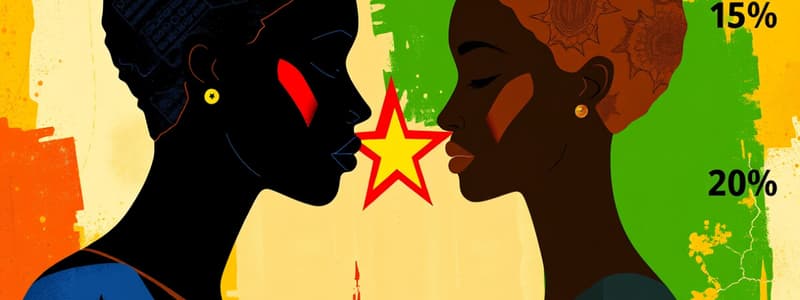Podcast
Questions and Answers
Western region recorded the lowest year-on-year increase in male unemployment at 47.6%.
Western region recorded the lowest year-on-year increase in male unemployment at 47.6%.
False (B)
Twelve regions experienced increases in urban unemployment between 2022 Q3 and 2023 Q3.
Twelve regions experienced increases in urban unemployment between 2022 Q3 and 2023 Q3.
True (A)
The average unemployment rate in the first three quarters of 2023 was 14.7 percent.
The average unemployment rate in the first three quarters of 2023 was 14.7 percent.
True (A)
The North East region showed the highest quarter-on-quarter increase in unemployment for males and females.
The North East region showed the highest quarter-on-quarter increase in unemployment for males and females.
Eight regions reported year-on-year increases in unemployment in urban areas.
Eight regions reported year-on-year increases in unemployment in urban areas.
The unemployment rate for males was higher than for females throughout the first three quarters of 2023.
The unemployment rate for males was higher than for females throughout the first three quarters of 2023.
In the second and third quarters of 2023, rural unemployment rates were nearly double those of urban areas.
In the second and third quarters of 2023, rural unemployment rates were nearly double those of urban areas.
Western North Region had the highest decline in unemployment in rural areas between the second and third quarters of 2023.
Western North Region had the highest decline in unemployment in rural areas between the second and third quarters of 2023.
Regions such as Greater Accra consistently recorded unemployment rates lower than the national average.
Regions such as Greater Accra consistently recorded unemployment rates lower than the national average.
Youth aged 15 to 35 years constituted more than three-quarters of the total unemployed persons in early 2023.
Youth aged 15 to 35 years constituted more than three-quarters of the total unemployed persons in early 2023.
Study Notes
Unemployment Overview
- Average unemployment rate for Q1 to Q3 2023 was 14.7%.
- Female unemployment rates consistently higher than males.
- Significant increase in female unemployment from Q4 2022 to Q1 2023, widening the gender gap.
Unemployment by Locality
- Urban unemployment rate nearly double that of rural areas in Q2 and Q3 of 2023.
- This widening gap indicates increasing economic disparity between urban and rural populations.
Regional Unemployment Trends
- Four regions (Eastern, Bono East, Oti, Upper West) had lower unemployment rates than the national average during 2023.
- Greater Accra and Ashanti regions consistently showed higher unemployment rates than the national average.
Age Group Employment Dynamics
- Highest labor force participation and absorption rates were observed in the 40 to 44 age group, correlating with the lowest unemployment rates for this demographic.
Youth Employment Statistics
- Youth aged 15 to 35 years comprised 77.4% of the unemployed individuals, totaling 1,374,329 in the first three quarters of 2023.
Year-on-Year Unemployment Changes
- Seven regions saw increases in male unemployment, with Western (111.1%) and Greater Accra (47.6%) leading.
- Year-on-year increases in unemployment evident in both rural and urban areas across multiple regions.
Quarterly Changes in Employment
- Over half of regions reported a rise in unemployment from Q2 to Q3 2023, with a notable 61.6% increase in North East Region.
- Five regions experienced concurrent increases in unemployment rates for both males and females.
Employment Status by Gender
- Females in non-agricultural self-employment without employees ranged from 40.2% to 41.6%.
- Males showed higher rates of engagement in agricultural self-employment.
Occupation Distribution
- Males were primarily employed in agriculture (39.8% to 44.1%), while females predominantly held positions in service and sales (38.9% to 41.7%).
- Females held a minimal share of roles as plant and machine operators (0.3%) compared to males (11.0%).
NEET (Not in Employment, Education, or Training) Trends
- NEET among youth increased by 3.6 percentage points between Q2 and Q3 of 2023, reversing a prior downward trend.
- Greater Accra region consistently reported NEET rates higher than national averages.
Employment Definitions
- Paid Employment: Work for which wage/salary is received, including temporarily absent workers.
- Persons Outside the Labour Force: Individuals aged 15+ who are neither employed nor unemployed, often due to various personal reasons.
- Self-Employment: Individuals operating their own enterprises without a specific employer.
- Self-Employed Without Employees: Own-account workers who do not consistently employ others.
- Work Definition: Activities performed to produce goods/services, regardless of remuneration status.
- Worked but Not Employed: Activities generating goods/services performed without pay.
Access to Data
- Detailed quarterly labor statistics can be accessed online for further exploration of employment trends.
Studying That Suits You
Use AI to generate personalized quizzes and flashcards to suit your learning preferences.
Related Documents
Description
This quiz explores the unemployment trends in Ghana from the first quarter of 2022 to the third quarter of 2023. It focuses on the disparities in unemployment rates between genders and the significant increase in female unemployment. Test your knowledge on the statistical data and its implications.




